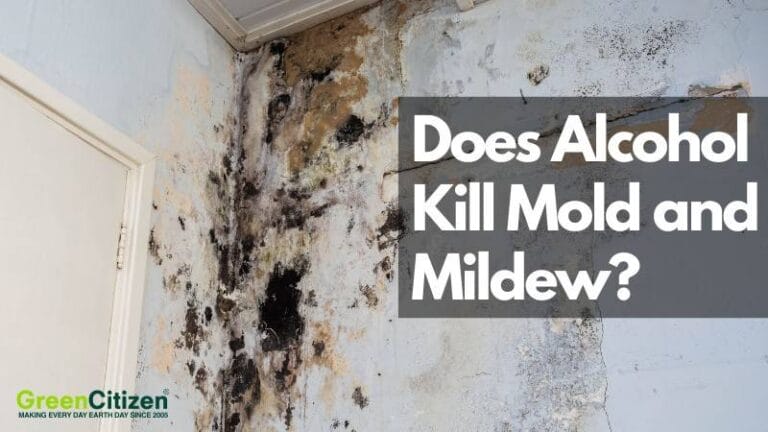Alcohol can kill and remove small patches of mold and mildew on hard, non-porous surfaces like tile, glass, sealed countertops, and metal. But here’s the big caveat: alcohol is not a complete mold solution. If you don’t remove the growth thoroughly and fix the moisture or humidity that caused it, mold can return.
In this guide, you’ll learn which type of alcohol works best (isopropyl vs ethanol), how long to leave it on (dwell time), how to use it safely (it’s flammable), and when to skip DIY and call a professional.
Key Takeaways
- Rubbing alcohol (isopropyl alcohol) can kill surface mold and mildew on hard, non-porous surfaces when applied correctly and wiped away.
- Alcohol is not a magic eraser for mold spores everywhere and it doesn’t fix moisture problems, which is why mold often returns.
- For porous materials (drywall, carpet, insulation, untreated wood) or large/recurring outbreaks, professional remediation is usually the safer, more reliable option.
Can Alcohol Kill Mold and Mildew on Surfaces?
Alcohol (especially rubbing alcohol / isopropyl alcohol) can kill surface mold and mildew on many hard, non-porous surfaces by damaging cell structures and drying quickly. It works best for small areas you can fully wipe clean, not for widespread growth or water-damaged materials.
Alcohol is popular because it’s widely available and doesn’t leave the strong residue some cleaners do. When it works, it usually works in a very specific scenario:
Best-case situation
- Small patch of visible mold or mildew
- On a hard surface (tile, glass, sealed stone, metal)
- You can ventilate the area and wipe everything away completely
Where alcohol struggles
- Deep growth in porous materials (drywall, fabric, carpet, insulation)
- Mold coming from behind walls, under flooring, or from ongoing leaks
- Repeated regrowth (usually a moisture problem, not a “cleaning product” problem)
What surfaces can alcohol be used on?
Alcohol tends to perform best on:
- Shower tile and grout (light growth)
- Glass and mirrors
- Sealed counters (test first)
- Stainless steel and other metals
What surfaces can alcohol damage?
Alcohol can discolor, dull, or weaken:
- Finished or unfinished wood
- Some paints and varnishes
- Acrylic, rubber, certain plastics
- Delicate stone finishes and coated surfaces
Can Mold Spores Survive in Alcohol?
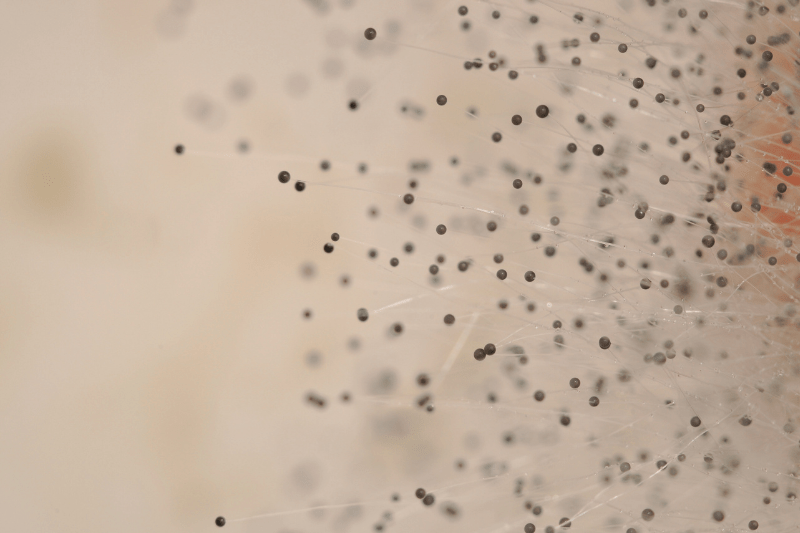
No, mold spores cannot survive in alcohol. However, in this case, the strength of alcohol is super important.
Ethyl alcohol, the type you find in grape juice fermentation, is a good example. Saccharomyces yeast thrives in grape juice, producing alcohol as a by-product until it reaches about 13–14%. Beyond that, the yeast slows down and stops working, though it can still function under ideal conditions up to 16–17%.
However, at 20% ethanol, nothing survives. This concentration is strong enough to preserve against molds. In my research, I found that ethanol kill mold just as effectively as other alcohol types.
Using high-proof alcohol can be quite handy for sanitizing around the house.
But the issue remains elsewhere.
Mold itself is pretty easy to kill. But killing a mold spore? That’s a different story! The real challenge is killing mold without causing cross-contamination and ensuring it doesn’t come back.
Think of mold like a dandelion, with the seeds being the spores. Imagine each spore has a protective layer around it, like an almond. Here’s the tricky part: when you spray mold with vinegar, bleach, or any mold killer, it’s like spraying a dandelion with weed killer. Before the spray even hits, thousands of spores are sent flying from the pressure of the droplets.
These spores can start new mold colonies wherever they land. Even the spores that get hit by the spray have that protective layer. So, like a dandelion, you can kill the plant, but if it’s gone to seed, it will spread.
Mold remediation is about mold removal, not just killing it. Removing the mold completely is the only way to ensure it doesn’t come back and spread.
What Type and Strength of Alcohol Works Best for Mold (Isopropyl vs Ethanol)?
Rubbing alcohol (isopropyl alcohol) is the most common choice for DIY mold and mildew cleanup. Ethanol (ethyl alcohol) can also work, but effectiveness depends on keeping the surface wet long enough to work, then wiping away the growth completely.
Isopropyl Alcohol (Rubbing Alcohol)
- Commonly sold as 70% or 91%
- Often used for household disinfection
- Useful for small mold/mildew patches on hard surfaces
Ethanol (Ethyl Alcohol)
- Found in some disinfectants and high-proof spirits
- Can work similarly for surface cleanup
- Usually more expensive (and less practical) than rubbing alcohol for this purpose
70% vs 91% vs 99%: Which Is Better?
This surprises people: higher isn’t always better for real-world cleaning.
- 70% often stays wet longer, giving more contact time.
- 91%+ evaporates fast, which can reduce effective dwell time unless you reapply.
- 99% can flash off quickly and may not stay in contact long enough.
If you already have 91%, it can still work, just make sure the area stays wet long enough (more on that below).
How Long Does it Take for Alcohol to Kill Mold?
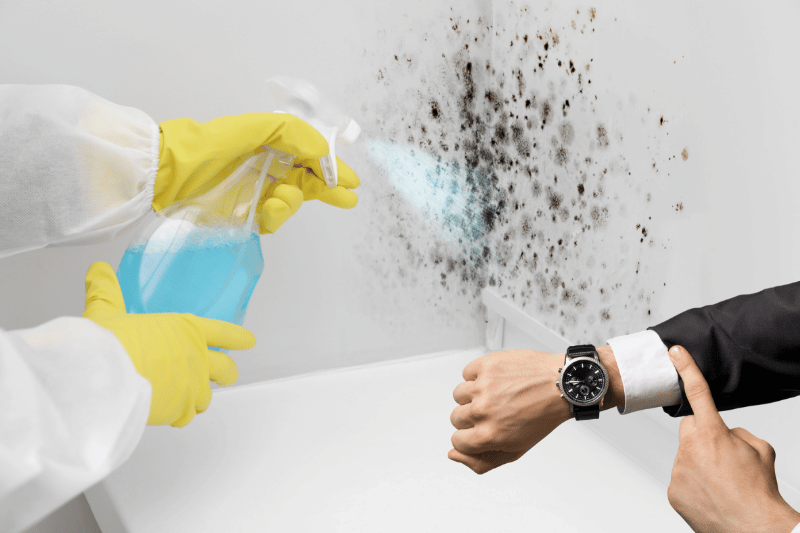
How long does it take for alcohol to kill mold? Well, the answer isn’t straightforward. From my experience, it can vary depending on the situation.
When I used rubbing alcohol to kill mold on some bathroom surfaces, I noticed it started working within a few minutes. The mold began to dissolve and wipe away easily. But here’s the catch: while alcohol can kill mold on contact, it might not be enough for stubborn infestations.
Some experts suggest leaving the alcohol on the mold for at least 15 minutes to ensure it kills the surface mold. However, this doesn’t mean the job is done. Unlike visible mold, mold spores, which are tiny and resilient, might still survive.
If you’re dealing with mold on hard surfaces like tiles or countertops, alcohol works fairly quickly. But on porous surfaces like fabrics or wood, it might take longer and may not be as effective.
You should also know that mold remediation usually takes about seven days.
How To Kill Mold with Alcohol
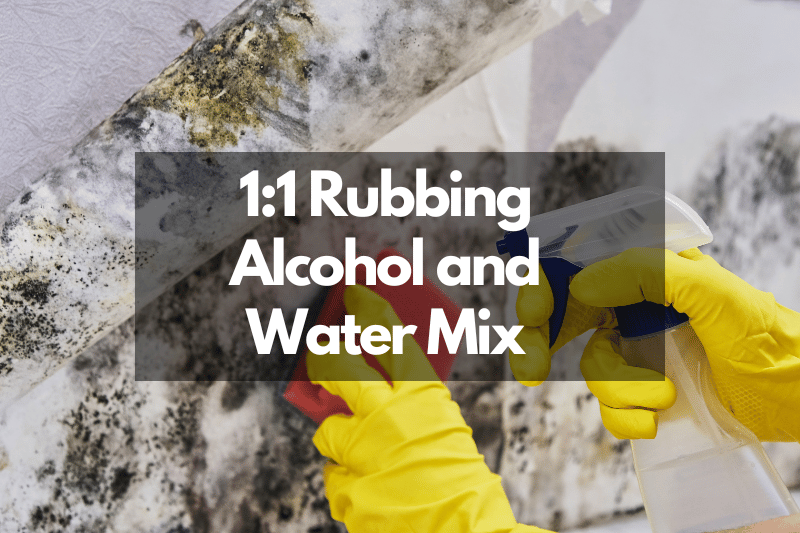
If you’re dealing with mold and want to try using alcohol to get rid of it, follow these simple steps. This mold removal process works best for small moldy areas on hard surfaces.
Alcohol can clean mold stains on porous surfaces, like fabrics. It is particularly effective for minor mold stains when combined with water, although it has a limited impact on mold and is not effective against every type of mold.
Step 1: Clean the Moldy Area
First, clean the moldy area with soap and water. This helps remove dirt and makes the alcohol more effective.
Step 2: Let the Surface Dry
After cleaning, let the surface dry completely. This is important because alcohol works better on dry surfaces.
Step 3: Mix Alcohol and Water
Next, mix together a 1:1 ratio of rubbing alcohol and water. You can use isopropyl alcohol, which is often the most effective. Pour the mixture into a spray bottle for easy application.
Ethanol can also be used to kill mold, though it’s less common than isopropyl alcohol.
Step 4: Apply the Alcohol Mixture
Spray the alcohol mixture onto the moldy area. If you don’t have a spray bottle, you can use a sponge to apply it. Make sure the moldy spots are thoroughly soaked with the solution.
Step 5: Let It Sit
Allow the alcohol to sit on the moldy area for at least 15 minutes. This gives it time to kill the mold effectively.
Step 6: Wipe Clean
After 15 minutes, wipe the area clean with a cloth. Make sure to remove all the mold and alcohol residue.
Step 7: Let the Surface Dry Again
Finally, let the surface dry completely. This helps prevent mold from returning.
Does Alcohol Kill Mildew?
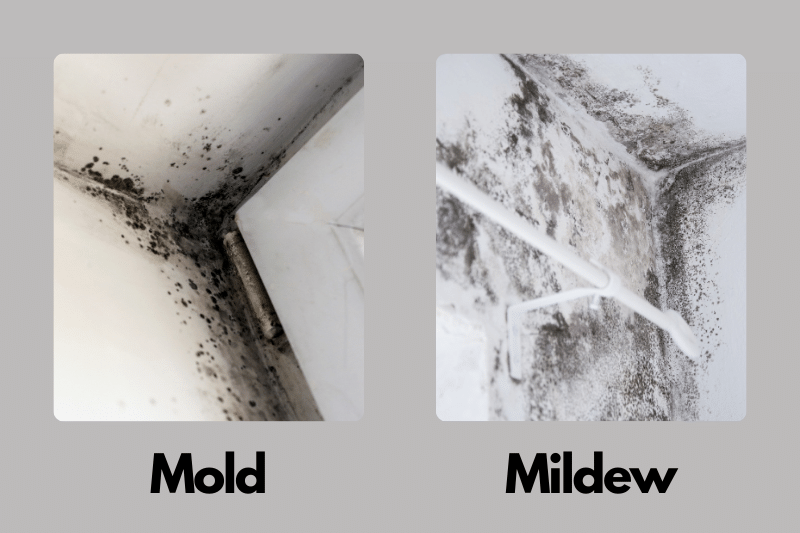
Yes, alcohol can kill mildew.
When I first tried using alcohol for mildew, I was surprised at how well it worked. I mixed rubbing alcohol with water in a 1:1 ratio and applied it to the mildew spots. After letting it sit for about 15 minutes, I wiped it away easily.
Alcohol is effective on hard surfaces. Ethanol kills mildew by breaking down its cell walls, making it easier to remove. Plus, it dries quickly, helping to prevent the mildew from returning.
However, alcohol doesn’t kill mildew spores. These tiny spores can survive and spread, so it’s important to keep the area dry and well-ventilated to prevent future growth.
Mildew can usually be cleaned with household cleaners and proper ventilation. Regular cleaning and reducing humidity can help prevent mildew growth. Using alcohol is a quick and easy way to clean small mildew spots.
But for larger infestations, you might need more thorough cleaning methods or professional help. Keeping your home dry and well-ventilated is key to preventing mildew in the first place.
What Kills Mold Better, Bleach or Alcohol?
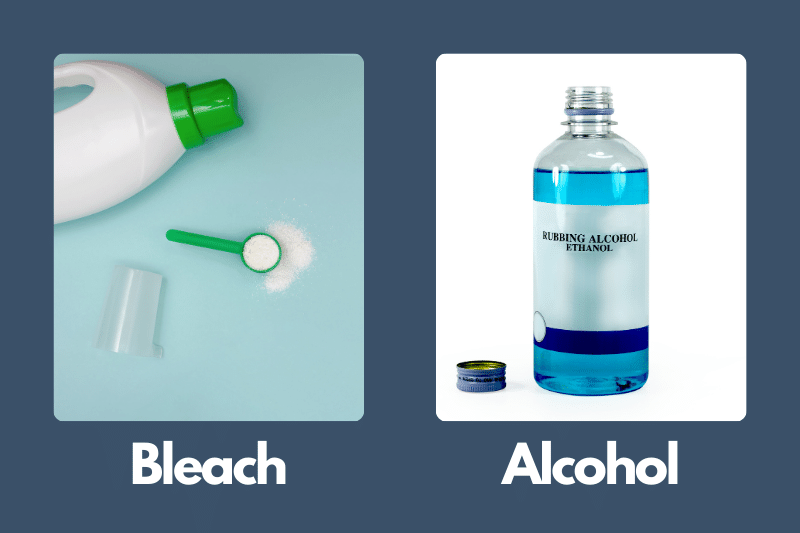
When it comes to treating mold, both bleach and alcohol are popular options. But which one is better? Let’s break it down.
Bleach
Bleach is a powerful mold killer. It works by destroying the mold’s cell structure. I’ve used bleach on stubborn mold in my bathroom tiles, and it was pretty effective. Here are some key points:
- Effectiveness: Bleach can kill mold on hard, non-porous surfaces like tiles and glass. It also whitens surfaces, making them look cleaner.
- Limitations: Bleach doesn’t work well on porous surfaces like wood or drywall. It can’t penetrate deep enough to kill mold roots, which means the mold can grow back.
- Health Risks: Bleach is a strong chemical and can be harmful to your health. It produces fumes that can irritate your skin, eyes, and respiratory system. Always use it in a well-ventilated area and wear protective gear.
Alcohol
Alcohol, particularly rubbing alcohol (isopropyl alcohol), is another effective mold killer. Here’s what I’ve found:
- Effectiveness: Alcohol kills mold on hard surfaces by breaking down the mold’s cell walls. It works well on tiles, glass, and countertops. It dries quickly, which helps prevent mold from returning.
- Limitations: Like bleach, alcohol doesn’t kill mold spores, so it might not prevent future mold growth. It also may not be as effective on porous surfaces.
- Safety: Alcohol is less harsh than bleach and generally safer to use. However, it’s flammable, so be careful when using it around heat sources.
| Cleaner | Best for | Pros | Cons |
|---|---|---|---|
| Alcohol (isopropyl/ethanol) | Small patches on hard surfaces | Fast drying, low residue | Flammable, can damage finishes, not a full prevention plan |
| Vinegar | Light surface growth | Accessible, simple | Strong smell, slower, still requires removal + drying |
| Hydrogen peroxide | Some surfaces and stains | Can help lift staining | Can discolor materials, spot-test needed |
| Bleach | Hard surfaces where whitening is desired | Visually “cleans” stains | Fumes, surface-limited, not ideal for porous materials |
Which is Better?
It depends on the situation. For non-porous surfaces and immediate cleaning, bleach can be more effective. But for a safer, less harsh option, alcohol is a good choice.
What Do Professionals Use to Kill Mold?
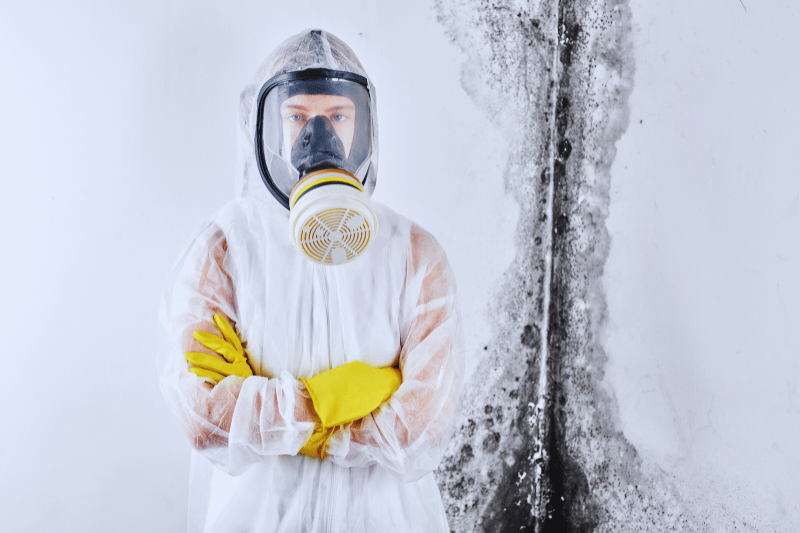
Professionals focus on containment + removal + drying, not only “killing.” They may use HEPA filtration, air scrubbers, dehumidifiers, antimicrobial treatments, and moisture detection tools to stop regrowth and prevent spores from spreading.
If you’re dealing with:
- mold that keeps returning
- strong musty odor with no visible source
- mold after flooding or water damage
- mold on porous building materials
- a larger affected area
…pros typically bring a system, not a spray bottle. That system often includes:
- Containment (to prevent spread)
- HEPA filtration/vacuuming (to capture particles)
- Moisture meters (to find hidden wet spots)
- Controlled removal (especially with porous materials)
- Drying equipment (dehumidifiers, fans, air movers)
- Post-clean prevention measures
If health concerns are involved (asthma, allergies, immune issues), it’s often wise to escalate sooner.
How to Prevent Mold and Mildew from Coming Back
Mold prevention is moisture control: lower humidity, fix leaks quickly, ventilate bathrooms and kitchens, and dry damp materials fast. If moisture remains, mold will treat your cleaning effort like a temporary intermission.
Here’s the “no encore performance” checklist:
Moisture Control Checklist
- Fix leaks (pipes, roof, windows) as soon as they appear
- Run a bathroom fan during showers and 20–30 minutes after
- Keep indoor humidity in check (a dehumidifier helps in damp climates)
- Dry wet areas quickly (fans + airflow)
- Avoid storing damp fabrics (towels, bath mats) in closed spaces
- Clean and maintain HVAC drip lines and filters
- Watch for condensation on windows and cold walls
Mold is basically a tiny opportunist with a real estate hobby. Take away the water, and it loses the plot.
FAQ
Alcohol can begin working quickly on light surface growth, but results depend on dwell time and wiping away the mold. Plan on keeping the area wet for 10–15 minutes, then removing and drying completely.
For most homes, rubbing alcohol (isopropyl alcohol) is the most practical option. Ethanol can also work, but is usually less convenient and more expensive.
High-proof alcohol can reduce surface contamination, but vodka is typically a weaker, costlier choice than rubbing alcohol. For DIY cleanup, rubbing alcohol is the better tool.
It can be safe for small jobs if you ventilate well and avoid flames and sparks. Alcohol is flammable and can irritate skin, so use gloves and airflow.
If mold is widespread, keeps returning, is on porous materials, follows water damage, or you suspect hidden growth behind walls or under floors, professional remediation is often the safest path.
Final Words
So, does alcohol kill mold and mildew? Yes, it can, especially for small patches on hard, non-porous surfaces where you can saturate, wait, and wipe everything away. But alcohol isn’t a long-term cure by itself. Mold’s real power source is moisture, and if that stays, mold has a reliable sequel contract.
Use alcohol as a practical tool in your cleaning kit, then finish the job the sustainable way: remove what you loosen, dry thoroughly, and fix the humidity or leak that invited mold in the first place.
If the problem is large, recurring, or embedded in porous materials, don’t gamble with your indoor air. Bring in professionals and get it handled right.
